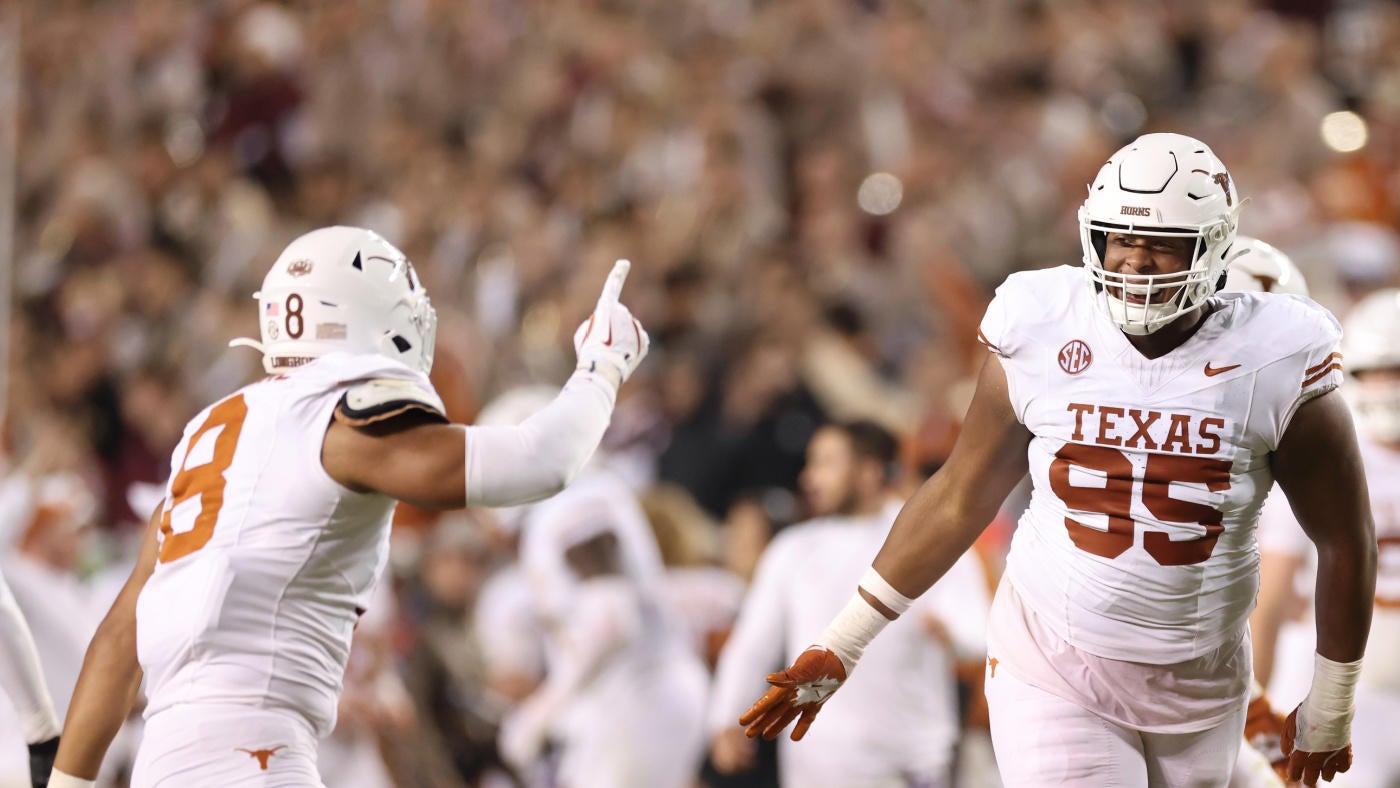
COLLEGE STATION, Texas — Thirteen years is a long time for hate to simmer.
It finally came to a boil Saturday evening as Texas and Texas A&M reunited on Thanksgiving weekend. The two programs had everything to play for: A SEC championship, their College Football Playoff lives and, of course, bragging rights more than a decade in the making.
The get-in price: More than $1,000, the most expensive ticket in history. The crowd? Tailgating started before as sun rose with College Gameday in town. Everyone from Matthew McConaughey and former Texas governor Rick Perry dotted the sidelines.
It had to be a classic, right?
Well, in a throwback sense at least. Texas’ defense pitched one of the best performances in program history, bailing out a turnover prone offense, and showcased what is evident after 12 games.
“We’re the best (defense) in the nation,” Texas defensive tackle Alfred Collins said.
Good luck arguing with Texas’ 6-foot-5, 320-pound All-American candidate at defensive tackle after the Longhorns’ 17-7 win on the road at No. 20 Texas A&M (8-4). Texas’ defense didn’t allow a point. The Aggies only managed to score after a Quinn Ewers‘ red zone pass was tipped and returned for a touchdown.
Otherwise, Texas A&M’s offense had no answers. It averaged 2.9 yards per rush, 4.3 yards per play, turned the ball over two times and went 0-for-3 on fourth down.
No moment better represents Texas A&M’s offensive helplessness better than a 4th-and-goal play from Texas’ one-yard line with 4:36 remaining. The Aggies, fresh off a blocked punt, had a chance to cut the Longhorns’ lead to three. Only one yard stood between Texas A&M and absolute pandemonium.
Texas linebacker Anthony Hill’s mindset in that moment? “Excited.”
“We feel like nobody is getting in the end zone with us,” Hill said. “If you think you’re going to just run right at us for one yard, that’s not going to happen.”
Run right at them Texas A&M did. The game basically ended there, Texas A&M’s 109,000-person crowd, such a weapon on a night in which Kyle Field quite literally shook from the swaying and stomping of the Aggie faithful, was silenced.
That’s the effect of Texas’ defense this season, which is not only the best in the country, but perhaps the best in modern program history.
The Longhorns are allowing just 11.7 points per game, the fewest they’ve allowed since 1983 (8.7 ppg) when Fred Akers’ Horns saw seven different players throw passes for a total of 1,401 yards on the season as the embers of the wishbone offense still glowed in Austin.
This is a far different era of college football — pace and space thrive — and yet defensive coordinator Pete Kwiatkowski’s unit is reaching similar standards; only two teams this season (Vanderbilt, Georgia) have managed to score 20 points on Texas.
CBS Sports Research
Texas head coach Steve Sarkisian’s words postgame could really describe his defense’s entire season: “It was an absolute dominant performance.”
It’s also had to be a bit too often this year.
Texas is supposed to be an elite offensive attack with a potential first-round pick at quarterback, 100-plus starts along the offensive line — including two potential first-round picks at offensive tackle, one of which, Kelvin Banks, left the game in the first half with an ankle injury — and a bevy of skill talent built through recruiting (five-star Ryan Wingo!) and the transfer portal (five-star Isaiah Bond!).
Except that group, for whatever reason, stalls out far too often. It managed zero first-half points against Georgia. It had six in the second half against Vanderbilt. The issue popped up again against Texas A&M with the Longhorns’ offense managing zero second-half points after an excellent first half effort in which they raced out to a 17-0 lead.
Worse still, Texas’ offense gave the Aggies’ life. First came the pick-six on a batted Quinn Ewers pass. Then came a fumble by Ewers in the red zone.
There are excuses you can make for Texas’ offense.
Ewers came into the week nursing an ankle injury and didn’t appear 100%, coming out of the game on several occasions for his backup QB Arch Manning to run zone-read plays in the red zone. Ewers’ tipped ball interception is what Sarkisian called a “bad luck” play. Same with the fumble. He played well otherwise and was on fire in the first half. But at the end of the day, once again, Texas’ defense had to bail its offense out.
“We have a lot of faith in our defense,” Texas tight end Gunner Helm said. “But we take it personally if we can’t capitalize … we have to take care of the football.”
Any 10,000-foot criticism of Texas this season starts with its schedule. In all likelihood, Texas will enter next week’s SEC Championship Game against Georgia without a current ranked win on its schedule.
But those gimmies are gone. Next up is Georgia. After that it’s either three or four teams ranked in the committee’s top 12.
The defense is good enough to survive that stretch. Texas won the 2005 national title allowing 16.4 points per game. This unit is nearly five points better than that one, at least to this point in the season.
Can the offense hold up its end of the deal? That’s the question that will decide whether Texas gets the national championship it wants so badly.
But, at least for now, Texas gets to revel in the chants of “SEC, SEC” that rained down at Kyle Field as the Longhorns mocked their rivals who bolted to the league nearly 13 years before them. As Texas moves onto the SEC championship game, there is little doubt: They, especially their defense, were ready for the SEC in Year 1.
“That wasn’t a gimmick win,” Sarkisian said. “We didn’t hit trick plays. We lined up and played hard-nosed football and executed and won a game in a physical manner, which is what we know we needed to do in the Southeastern Conference.”



